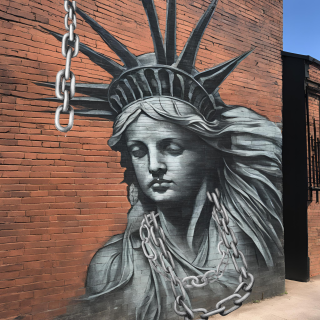Anger
Express Political Outrage Skillfully: Alternate Rebellion
DBT skills that may help with the 2024 election.
Updated July 18, 2024 Reviewed by Abigail Fagan
Key points
- Alternate rebellion means expressing intense emotions skillfully (and reducing negative consequences).
- In this heated political environment, you can be a rebel with a cause, expressing your outrage creatively.
- Honor and act on your political anger in ways that don't harm yourself or others.

As the 2024 election approaches, political discourse has reached a fever pitch. For many, the constant stream of debates, ads, and polarizing opinions is a source of frustration and anger. While these emotions are natural, finding ways to express them constructively is crucial. Dialectical Behavior Therapy (DBT) offers a unique skill called alternate rebellion, which can help channel political anger into positive action.
Understanding Alternate Rebellion
DBT, developed by Dr. Marsha Linehan, is a behavior therapy that changes what we do and how we think to help us build a meaningful, values-based life. One of its lesser-known skills, alternate rebellion, involves finding non-destructive ways to express defiance and assertiveness. This skill is particularly useful when facing situations that evoke feelings of powerlessness or rage, such as political conflicts.
Why Political Anger Matters
Political anger, especially during election seasons, can be overwhelming. It stems from a deep sense of injustice or concern about the future. That anger can lead to impulsive actions, strained relationships, and emotional burnout. Or it can motivate transformative skillful expression. Learning to harness your outrage using alternate rebellion can turn a potentially harmful emotion into a force for positive change.
Steps to Practice Alternate Rebellion
- Pinpoint the source of your anger: Is it a particular policy, a candidate's rhetoric, or the behavior of others? Understanding the root cause is essential for channeling your emotions effectively.
- Acknowledge Your Feelings: Allow yourself to feel the anger without judgment. Recognize that it's a valid emotion in response to something you care deeply about.
- Choose a Constructive Outlet: Alternate rebellion encourages finding healthy ways to express defiance. Consider these options:
- Artistic Expression: Create art, music, or writing that reflects your political views. This can be a cathartic way to process emotions and share your perspective.
- Community Involvement: Engage with local organizations or volunteer for causes that align with your values. This direct action can provide a sense of agency and contribute to meaningful change.
- Social Media Advocacy: Use social platforms to raise awareness about issues that matter to you. Ensure your posts are constructive and aim to inform rather than inflame.
- Contact Your Elected Representatives: These communications do matter.
- Practice Mindfulness and Self-Compassion: Mindfulness can help you stay grounded and present, reducing the intensity of your anger. Self-compassion involves treating yourself kindly when upset and acknowledging that it's okay to feel this way.
- Set Boundaries: Protect your mental health by setting limits on political discussions and media consumption. Know when to step back and take a break to avoid becoming overwhelmed.
- Engage in Problem-Solving: Channel your energy into finding solutions rather than focusing solely on the problem. This proactive approach can shift your mindset from frustration to empowerment.
- Artistic Expression: Create art, music, or writing that reflects your political views. This can be a cathartic way to process emotions and share your perspective.
- Community Involvement: Engage with local organizations or volunteer for causes that align with your values. This direct action can provide a sense of agency and contribute to meaningful change.
- Social Media Advocacy: Use social platforms to raise awareness about issues that matter to you. Ensure your posts are constructive and aim to inform rather than inflame.
- Contact Your Elected Representatives: These communications do matter.
Edgier, Riskier Ideas for Alternate Rebellion
For those who prefer a more unconventional approach, here are some edgier, riskier ways to practice alternate rebellion:

- Guerilla Art Installations: Use public spaces to create provocative art installations highlighting political issues. This could involve murals, street art and other mediums designed to provoke thought and conversation. If that seems intimidating...start with something small, subtle and subversive.
- Satirical Performances: Organize or participate in street theater or flash mobs that satirize political figures or policies. These performances can grab attention and make a bold statement. Look for political theatre or comedy happening in your area and get involved.
- Zines and Underground Publications: Create and distribute zines or underground publications that offer alternative viewpoints and critical commentary on political matters. These can be shared in physical form or online, providing a platform for marginalized voices.
- Creative Protests: Plan and execute creative, non-violent protests that draw attention to your cause in unexpected ways. This could involve unusual attire, symbolic acts, or interactive demonstrations that engage the public.
- Political Pranks: Engage in harmless pranks that draw attention to political issues. For example, creating ironic campaign slogans and printing them on t-shirts, posters and other "campaign" merch to highlight absurdities in the political landscape without causing harm.
- Radical Self-Expression: Use your appearance as a canvas for political statements. This could include bold fashion choices, body art, or temporary tattoos that convey your views.
- Subversive Social Media Campaigns: Launch social media campaigns that use satire, humor, and irony to critique political issues. Memes, parody accounts, and viral challenges can spread your message widely and quickly.
Real-Life Examples
Banksy is an anonymous England-based street artist known for his provocative and satirical street art. His works often address political and social issues. One of his famous pieces, "Balloon Girl," has been interpreted as a commentary on hope and loss. Banksy's art often appears overnight on walls and buildings, delivering powerful messages against war, consumerism, and government surveillance.
Feminist icon Barbara Kruger uses her bold text overlays on black-and-white photographs to create powerful political messages. Her works often challenge consumerism, gender stereotypes, and political authority. One of her famous pieces, "Your Body is a Battleground," was created for the Women's March on Washington in 1989 and remains a powerful feminist statement.

Use Your Voice
The 2024 election season is likely to evoke strong emotions. By using DBT's alternate rebellion skill, instead of harming yourself or others by acting out in destructive ways, you can harness your creativity and perspective productively. Whether through artistic expression, community involvement, or mindful advocacy, you can make a positive impact while maintaining your emotional well-being. Embrace your anger as a catalyst for change. Let alternate rebellion guide you toward a more empowered and effective way to express yourself.
For more ideas and a deeper understanding of alternate rebellion, Chapter 17 of DBT for Life: Skills to Transform the Way You Live is all about alternate rebellion.




